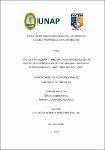Cultura financiera y tributaria en estudiantes de las escuelas profesionales de Contabilidad y Negocios Internacionales – Unap, sede Iquitos – 2022
Abstract
The present investigation covered the level of financial and tax culture, reached by the students of the professional schools of Accounting and International Business and Tourism of the UNAP, from the Iquitos headquarters, period 2022, having developed a descriptive – quantitative study – not experimental. The study population and the sample consisted of 122 students enrolled in the fifth level, using the survey technique and the questionnaire as an instrument. The level of financial education was identified, finding that the students of both schools have a medium level; therefore, the degree of knowledge acquired within their higher education was not as expected (high level), however, they develop consumption-oriented practices and savings habits, with a good administration of their resources and consider the importance of taking efficient and responsible financial decisions. Likewise, the level of tax education was identified, finding that university students have a medium level, therefore, although the results obtained are not the desired ones (high level); however, they demonstrated to have acceptable knowledge and good training, because they develop tax awareness practices, which are related to tax obligations, and also opt for making better decisions. La presente investigación abarcó el nivel de cultura de tipo financiera y tributaria, alcanzado por los estudiantes de las escuelas profesionales de Contabilidad y Negocios Internacionales y Turismo de la UNAP, de la sede Iquitos, período 2022, habiéndose desarrollado un estudio tipo descriptivo – cuantitativa – no experimental. La población de estudio y la muestra estuvo conformada por 122 estudiantes matriculados en el quinto nivel, utilizándose la técnica de la encuesta y como instrumento el cuestionario. Se identificó el nivel de educación financiera, encontrándose que los estudiantes de ambas escuelas tienen un nivel medio; por lo tanto, el grado de conocimiento adquirido dentro de su formación superior no fue lo esperado (nivel alto), sin embargo, desarrollan prácticas de orientación al consumo y hábitos de ahorro, con una buena administración de sus recursos y consideran la importancia de tomar decisiones financieras eficientes y responsables. Asimismo, se identificó el nivel de educación tributaria, encontrándose que en los estudiantes universitarios tienen un nivel medio, por lo tanto, aunque los resultados obtenidos no son los deseados (nivel alto); sin embargo, demostraron tener un conocimiento aceptable y una buena formación, porque desarrollan prácticas de conciencia tributaria, que se relacionan con las obligaciones tributarias, además optan por tomas mejores decisiones.
Collections
- Tesis [341]


